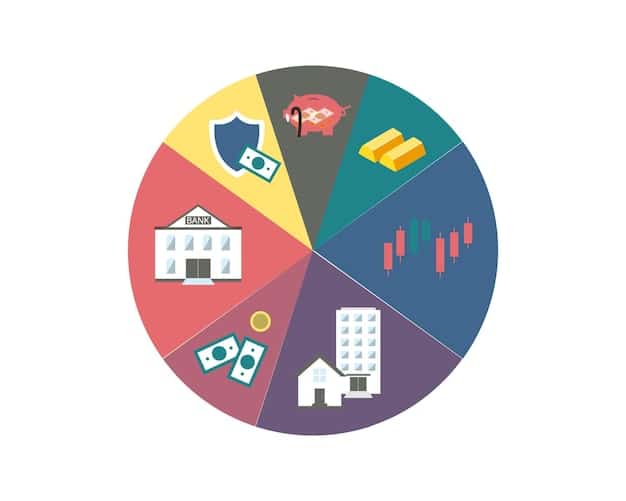Recession-Proof Your Portfolio: Personal Investment Strategies for 2025

Personal investment strategies for a recession in 2025 involve diversifying assets, focusing on defensive stocks, considering bonds, and maintaining a long-term perspective to navigate economic uncertainty effectively.
Navigating the complexities of personal finance requires foresight, especially with potential economic downturns on the horizon. Preparing your investments for a recession is not about predicting the future, but rather strategically positioning your portfolio to weather economic storms. This guide delves into personal investment strategies for a recession: protecting your assets in 2025 and beyond.
Understanding the Economic Landscape Leading to 2025
Before diving into specific investment strategies, it’s crucial to understand the economic climate expected in the lead-up to 2025. Factors such as inflation, interest rate hikes, and global economic slowdowns can all contribute to recessionary pressures. By recognizing these potential triggers, investors can proactively adjust their portfolios.
Understanding these markers will help give you some foresight to predict and possibly sidestep a recession.
Key Economic Indicators to Watch
Monitoring key economic indicators can provide valuable insights into the health of the economy and potential recessionary risks. These indicators act as early warning signs, allowing investors to make informed decisions.
- Gross Domestic Product (GDP): Declining GDP growth is a primary indicator of economic slowdown.
- Unemployment Rate: A rising unemployment rate signals weakening economic conditions.
- Inflation Rate: High inflation erodes purchasing power and can lead to economic instability.
- Consumer Confidence Index: Declining consumer confidence often precedes a decrease in spending and economic activity.
Staying informed about these factors is essential for making well-timed investment decisions. The signs might be subtle, but spotting them could save you money.

Defensive Stocks: A Safe Haven in Uncertain Times
Defensive stocks are shares of companies that tend to perform relatively well regardless of the overall economic climate. These companies provide essential goods or services that people continue to demand even during recessions, making them a stable investment option.
These companies are often found in sectors such as healthcare, consumer staples, and utilities. Consider these options.
Characteristics of Defensive Stocks
Defensive stocks possess several key characteristics that make them attractive during economic downturns.
- Stable Demand: Products and services are essential, ensuring consistent revenue.
- Consistent Dividends: Many defensive stocks offer reliable dividend payments.
- Low Volatility: Less prone to dramatic price swings compared to growth stocks.
Investing in defensive stocks can help protect your portfolio from significant losses during a recession. These stocks are resilient to downturns and are a solid investment option.
In conclusion, defensive stocks offer stability and reliability, making them a crucial component of a recession-resistant investment strategy.
The Role of Bonds in Recession-Proofing Your Portfolio
Bonds are often considered a safe investment during economic uncertainty. As fixed-income securities, bonds can provide a steady stream of income and act as a buffer against stock market volatility. Investing in bonds is an important step in protecting your assets.
Bonds offer a level of predictability that stocks often lack. They are a great way to hedge your bets.
Types of Bonds to Consider
There are different types of bonds with varying levels of risk and return. Understanding these options is key to making informed decisions.
- Government Bonds: Issued by governments, considered low-risk and offer stability.
- Corporate Bonds: Issued by corporations, offer higher yields but carry more risk.
- Municipal Bonds: Issued by state and local governments, can be tax-exempt.
How Bonds Protect Your Portfolio
Bonds offer several benefits during a recession.
Primarily, they provide predictable income. The fixed interest payments from bonds can provide a steady cash flow during economic downturns. During recessions, bonds typically exhibit lower volatility than stocks, making them a safe option for investors.
In conclusion, bonds provide a stable and reliable haven during economic storms. A portfolio including bonds protects against financial uncertainty and keeps you safe.

Diversification: Spreading Risk Across Different Asset Classes
Diversification is a cornerstone of sound investment strategy, especially during periods of economic uncertainty. Spreading your investments across various asset classes can minimize risk and enhance long-term returns. Diversifying helps maintain a level of financial health.
Don’t put all your eggs in one basket. A balanced approach is often the best approach.
Key Asset Classes for Diversification
Diversifying across multiple asset classes can help reduce the impact of any single investment on your overall portfolio.
- Stocks: Offer growth potential but come with higher volatility.
- Bonds: Provide stability and income.
- Real Estate: Can provide rental income and long-term appreciation.
- Commodities: Act as a hedge against inflation and economic uncertainty.
A well-diversified portfolio should include a mix of these asset classes to balance risk and return.
In summary, diversification involves spreading investments across various asset classes to reduce risk. Diversifying can enhance long-term returns and create a layer of financial stability for investors.
Real Estate: A Tangible Asset in Tumultuous Times
Real estate can be a valuable asset class in a diversified investment portfolio, especially during economic downturns. Tangible assets like real estate can provide a sense of security and potential for long-term appreciation. Real estate could be for you.
It can be a safe bet in times of uncertainty. However, do your homework before investing.
Strategies for Investing in Real Estate During a Recession
There are several strategies for investing in real estate during a recession, each with its own set of advantages and considerations.
- Rental Properties: Generate passive income through rental payments.
- REITs (Real Estate Investment Trusts): Invest in a portfolio of properties without direct ownership.
- Distressed Properties: Purchase undervalued properties for potential renovation and resale.
Each of these strategies offers unique benefits and risks, depending on market conditions and individual investment goals.
Real estate can provide stability and potential for long-term growth. However, make sure you explore the options before making the jump. It requires foresight, planning and the ability to navigate the complexities of the market.
The Importance of Cash Reserves and Liquidity
Maintaining adequate cash reserves is crucial to weathering economic downturns. Cash reserves provide a safety net for unexpected expenses and investment opportunities that may arise during a recession. A liquid fund is a safe fund.
You may be grateful you have a fund set aside for an emergency.
Building and Maintaining Cash Reserves
Building and maintaining an adequate cash reserve involves several steps.
- Assess your monthly expenses and set a target for your emergency fund.
- Automate savings to consistently build your cash reserves.
- Keep your cash reserves in a liquid and easily accessible account.
Cash reserves are a crucial component of weathering the storm and are important to be aware of. It provides a safety net for you and your family.
In conclusion, cash reserves provide a safety net for unexpected expenses and investment opportunities. They also help you avoid selling investments at a loss during a recession.
| Key Point | Brief Description |
|---|---|
| 🛡️ Defensive Stocks | Invest in companies providing essential goods. |
| 📈 Bonds | Add stability with government or corporate bonds. |
| 🏘️ Real Estate | Consider rental properties or REITs. |
| 💰 Cash Reserves | Maintain liquid funds for emergencies and opportunities. |
[FAQ]
What are defensive stocks?
▼
Defensive stocks are shares of companies that remain stable during a recession because they supply essential products or services, such as utilities, healthcare, and basic consumer goods.
▼
Bonds are seen as safer due to their fixed-income structure. They provide a steady stream of income and are generally less volatile than stocks, making them suitable during economic downturns.
▼
Diversification spreads investments across various asset classes, such as stocks, bonds, and real estate. This reduces dependency on one asset’s performance, mitigating the overall risk to your portfolio.
▼
Real estate can be beneficial as it’s a tangible asset that tends to retain value. Rental properties, in particular, can provide a consistent income stream, offering stability during economic uncertainty.
▼
Cash reserves offer liquidity, allowing you to handle unexpected expenses or take advantage of investment opportunities that arise during a recession. They also help prevent selling investments at a loss.
Conclusion
Preparing your personal investments for a recession requires a proactive approach. By understanding key economic indicators, diversifying your portfolio, and maintaining adequate cash reserves, you can navigate economic uncertainty while safeguarding your financial future.





